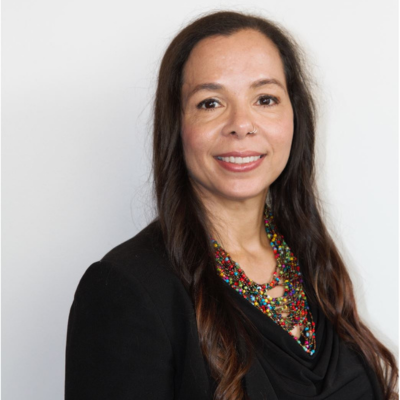Olivia Vélez, PhD MS MPH RN FAAN, is a health informaticist leading global digital transformation as the Director of Technical Services for PATH. With a commitment to advancing global health, Dr. Vélez spearheads transformative initiatives, overseeing the digital health and data science teams. As co-chair emeritus of the Global Digital Health Network, she passionately guides the Women's Leadership workshop and supports the co-chairs in the planning and execution of the Global Digital Health Forum. Driven by the belief that digital health tools are pivotal in strengthening health systems, reducing global health inequities, and fostering a resilient health workforce, she stands as a dedicated advocate for the intersection of technology and health equity on a global scale.
All Sessions by Dr. Olivia Vélez
AI and Global Health: A workshop for Leaders Driving Change
AI has the potential to improve health outcomes, enhance health systems, and address health inequities. Its integration into Global Health presents opportunities to improve disease diagnosis, treatment, and surveillance.
However, AI also poses significant challenges and risks, such as ethical, legal, social, and technical issues, that need to be carefully considered and addressed by health leaders.
Global health leaders, who are responsible for setting health policies, strategies, and priorities at the programmatic, regional and global levels, need to have an understanding of AI and its implications for health.
By the end of the workshop, the participants are expected to:
- Define AI and its subfields, and how they relate to health.
- Describe current initiatives and AI for health activities in the global health space.
- Explain some of the current and emerging use cases of AI for health, and their benefits and limitations.
- Summarize issues specific to gender and data and other key challenges and risks of AI for health, and how to address them.
- Articulate some of the best practices and principles for ensuring that AI for health is responsible, ethical, and human-centered.
- Communicate and collaborate with various stakeholders on AI for health issues and initiatives.
The workshop will be facilitated by a team of experts from various disciplines and backgrounds, such as AI, digital health, ethics, policy, and education. The facilitators will provide relevant and up-to-date information, insights, and guidance on AI for health, and will also encourage active participation and feedback aligned with feminist pedagogies.
Driving Ethics & Equity through Digital Innovations: The future of Al in Global Health
Led by: WomenLift Health.
Digital innovations such as AI are rapidly evolving to become crucial components of our everyday lives: from basic technology to revolutionizing primary care, the applications of AI are widespread. This session will feature accomplished leaders and experts who are driving equitable and ethical innovation and supporting the next generation of digital health and AI leadership. Together, participants will explore steps we can take to build equity and inclusivity into tools, including by diversifying women leadership in the field.
Moderator: Joy Kamunyori, Senior Health Information Systems Advisor, USAID
Speakers:
1. Dr Muthoni Ntonjira, Managing Director and Health Systems District Leader, Philips East Africa
2. Dr Olivia Velez, Director of Technical Services, Center of Digital and Data Excellence, PATH
3. Fraiser Kilonzo, Cyber Security Engineering Lead, Cyber Guard Africa
4. Caroline Mbindyo, CEO, Amref Health Innovations
Quiet Quicksand: Caregiving as a key Determinant to Gender Equal Leadership
Led by: WomenLift Health Alumnae.
While the detriments of dependent and/or elder caregiving are increasingly being documented, including diminished mental and physical health, financial security, career prospects, and overall well-being, the complex dynamics of those outcomes are not well studied. The data that is available about those with multiple caregiving responsibilities confirms that it is not easy and it also comes largely from Europe and North America. It comes from wealthy nations, places with formal (albeit broken) welfare systems. This focus on the Global North has shaped the way we think about the consequences of intergenerational transfer. This means we lack a comprehensive understanding of the magnitude, determinants, or impact of the caregiving experience. These individuals are subsidizing entire economies, yet their heavy labor is invisible. Current momentum to measure unpaid work and the global care economy brings recognition to the matter.
How should the lived experience of caregiving be valued and integrated by employers and colleagues? The session will explore questions like: What value does caregiving add? What leadership skills does it lend to the workplace? How can these skills be maximized for impact? What novel systems should be built from the ground up to reflect the profile of the workforce now versus simply adapting anachronistic structures designed for a fraction of the population? How can we, as leaders, advocate for the integration and scaling of such novel systems and policies?
Speakers:
1. Brooke Cutler, Gender Equity and Global Health Consultant
2. Paurvi Bhatt, MPH, President and Chief Impact Officer, Rosalynn Carter Institute for Caregivers
3. Ms. Evelyne Opondo, Africa Director, International Center for Research on Women
4. Dr Olivia Velez, Director of Technical Services, PATH
5. Alison Varco, Program Officer, Bill & Melinda Gates Foundation’s Women in Leadership

